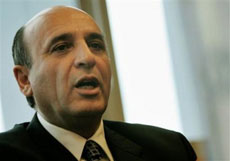|
Hamas Poll Manifesto Drops "Israel Destruction": Report
 |
|
Hamas
has dropped its call for the destruction of Israel from its manifesto
for the Palestinian parliamentary election, according to The Guardian.
(Reuters).
|
LONDO,
January 12, 2006 (IslamOnline.net & News Agencies) – Palestinian
resistance movement Hamas has dropped its call for the destruction of
Israel from its manifesto for the Palestinian parliamentary election
in a fortnight, bringing the group closer to the rules of the
political process, according a British daily Thursday, January 12.
The
Islamic group still calls for the maintenance of armed resistance
against Israeli occupation, but it steps back from Hamas's 1988
charter demanding Israel's eradication and the establishment of a
Palestinian state in its place, according to The Guardian.
"The
manifesto makes no mention of the destruction of the Jewish state and
instead takes a more ambiguous position by saying that Hamas had
decided to compete in the elections because it would contribute to
'the establishment of an independent state whose capital is
Jerusalem'."
Hamas,
expected to put on a strong performance against President Mahmoud
Abbas' Fatah group, has come under growing pressure from Israel,
Washington and the European Union.
The
Mideast Quartet has called for any future Palestinian government not
to include members of groups "not committed to Israel's right to
exist".
"The
Quartet expressed its view that a future Palestinian Authority Cabinet
should include no member who has not committed to the principles of
Israel's right to exist in peace and security and an unequivocal end
to violence and terrorism," the Quartet said in a statement,
December 28, 2005.
The
statement of the international committee, which groups the United
States, European Union, the United Nations and Russia, was referring
to the resistance group Hamas, but without naming it.
Hamas,
which is putting up candidates for parliament for the first time, is
expected to do well against President Mahmoud Abbas's fractured Fatah
in the January 25 legislative polls.
Future
Generations
 |
|
"We will not accept a terrorist (Palestinian) Authority after the elections," Mofaz said.
|
According
to The Guardian's report, opinion polls give Hamas more than a
third of the popular vote, built on a campaign against Fatah's endemic
corruption and mismanagement and failure to contain growing
criminality, and by claiming credit for driving the Israeli army and
settlers out of Gaza.
But,
according to the daily, the manifesto continues to emphasize the armed
struggle. "Our nation is at a stage of national liberation, and
it has the right to act to regain its rights and end the occupation by
using all means, including armed resistance."
The
Guardian quoted Gazi Hamad, a Hamas
candidate in the Gaza Strip, as saying the manifesto reflected the
group's position of accepting an interim state based on 1967 borders
but leaving a final decision on whether to recognize Israel to future
generations.
"Hamas
is talking about the end of the occupation as the basis for a state,
but at the same time Hamas is still not ready to recognize the right
of Israel to exist," he told the paper.
"We
cannot give up the right of the armed struggle because our territory
is occupied in the West Bank and East Jerusalem. That is the territory
we are fighting to liberate."
But
Hamad said the armed resistance was no longer Hamas's primary
strategy. "The policy is to maintain the armed struggle but it is
not our first priority. We know that first of all we have to put more
effort into resolving the internal problems, dealing with corruption,
blackmail, chaos. This is our priority because if we change the
situation for the Palestinians it will make our cause stronger.
"Hamas
is looking to establish a new political strategy in which all
Palestinian groups will participate, not just dominated by Fatah. We
will discuss the negotiation strategy, how can we run the conflict
with Israel but by different means."
The
daily quoted Ghassan Khatib, a Palestinian cabinet minister and member
of the Palestinian People's party, as saying he believed Hamas was
being forced to face reality as it prepared to sit in parliament, and
that it would have to embrace a negotiated settlement with Israel.
"Having
Hamas inside the system is a positive development whereby they have to
abide by the rules of the majority and respect the arguments of the
administration they are part of, which includes a state built on 1967
borders. It will take time but Hamas will no longer have their own
militia. It will be solely a political force."
Israeli
Defiance
But
Israel's security establishment predicts that if Hamas does as well as
expected in the election it will damage the Palestinian Authority and
further undermine the prospects for an agreement.
Agence
France-Presse (AFP) quoted Israeli Defense Minister Shaul Mofaz as
saying Thursday that Israel will not accept the emergence of a
"terrorist" Palestinian Authority after this month's
parliamentary election.
"We
will not accept a terrorist (Palestinian) Authority after the
elections and we demand that (Palestinian leader) Mahmud Abbas
presents a plan on dismantling terrorist organizations," AFP
quoted him as telling public radio.
Mofaz
was speaking after talks in Tel Aviv with US officials David Welch,
assistant secretary of state for Near Eastern affairs, and Elliot
Abrams, White House envoy on the Middle East.
Israel
is opposed to the participation of Hamas.
"Presenting
a plan against terrorist organizations is a condition for implementing
the roadmap," said Mofaz.
The
internationally drafted pace plan, which has made next to no progress
since its launch in 2003, calls for an end to Israeli-Palestinian
violence, a freeze in Israeli settlement activity and the creation of
a Palestinian state.
The
Israeli cabinet is expected Sunday to formally allow Palestinians
living in occupied and annexed east Jerusalem to vote in the January
25 poll, a decision that Mofaz announced last week has already been
made in principle.
|